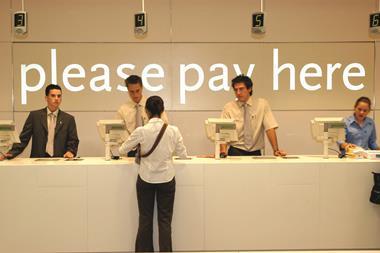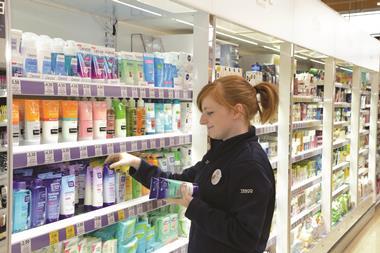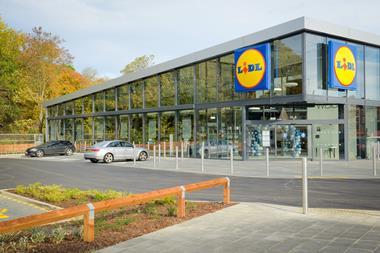- Aldi to pay “market-leading” rates of pay from February 2016
- Discounter to pay £8.40 per hour and £9.45 to staff in London
- Outstrips rates of £8.20 and £9.35 revealed by Lidl last month
- Aldi boss Barnes reaffirms commitment to ”best pay and benefits in the industry”
Aldi has gazumped discount rival Lidl’s new rates of pay by pledging to award its store staff at least £8.40 per hour from early next year.
The German grocer has revealed it will adopt the “market-leading” pay rates, which will also see store staff in London paid a minimum of £9.45 per hour, from February 1, 2016.
Aldi’s new rates easily outstrip Chancellor George Osborne’s suggested living wage of £7.20 an hour for workers over the age of 25, and top the £8.20 rate adopted by Lidl earlier this month.
Lidl, which also pays staff in London the Living Wage Foundation’s recommended rate of £9.35 an hour, boasted that it was the first supermarket in the UK to pay workers a real living wage when it unveiled details of the move in September.
Discussing Lidl’s strategy during an exclusive interview with Retail Week earlier this month, Aldi UK boss Matthew Barnes admitted the retailer was “considering what’s going on in the market”.
“Just as Aldi won’t be beaten on the low prices of our products, we are also committed to offering the best pay and benefits in the industry”
Matthew Barnes, Aldi
But in an apparent pop at its fiercest competitor, Aldi said today that its new rates of pay were “significantly higher than the hourly pay offered by all other British supermarkets” and maintained its position as “the best supermarket employer in Britain”.
Aldi, which already pays its store assistants a minimum of £8.15 per hour, added that the “true value” of employee pay was further boosted because it pays its staff during breaks.
Staff in the Republic of Ireland will also benefit from the move, with the minimum hourly rate of pay set to increase to €11.50 (£8.26) for staff at its Irish stores.
It comes as Aldi revealed plans to recruit and train 600 new apprentices from 2016 and opened its 600th store in Cardiff. The discounter is targeting 1,000 stores across the UK by 2022.
‘Bold’ move
Unveiling the new wage levels, Barnes said: “Just as Aldi won’t be beaten on the low prices of our products, we are also committed to offering the best pay and benefits in the industry.
“The success of Aldi in the UK and Ireland has been driven by the commitment, hard work and ambition of our employees and we will continue to maintain our leading position on pay.”
Living Wage Foundation director Sarah Vero added: “We welcome the fantastic news that Aldi is set to raise its hourly wages to rates far above the national minimum and the premium for over 25s.
“Their bold move demonstrates that paying the living wage in retail is achievable, despite other major supermarket chains telling campaigners that higher wages for the lowest paid are simply not possible.
“The economic climate has shifted. It’s time for business to recognise we need a recovery for all.”
Retailers rethink pay
Retailers have been jockeying for position on the living wage ever since Osborne unveiled the compulsory national living wage of £7.20 an hour during his summer Budget. That rate, which comes into force next April, is set to rise to £9 by 2020.
But a number of businesses have wasted little time in setting their stall out early and pledging to increase the pay of workers.
Swedish furniture specialist Ikea became the first UK retailer to sign up to pay its staff the rates the Living Wage Foundation has been campaigning for of £7.85 per hour and £9.15 per hour to people working in London. Those changes will come into force in April 2016.
Aldi’s grocery rival Sainsbury’s handed its 137,000 shopfloor workers a 4% pay rise in August, with staff of all ages now earning £7.36 per hour.
Morrisons, which currently pays store staff a minimum of £6.83 per hour, is increasing that rate to £8.20 from March, while Oliver Bonas became the first UK high street employer to implement the ‘real’ living wage of £9.15 an hour in London, and £7.85 outside when it changed its rates on September 1.
The UK’s largest retailer, Tesco, pays its shopfloor staff £7.39 per hour, while Asda staff working outside London earn £7 per hour.
However, Next boss Lord Wolfson warned that the living wage would cost the retailer £2m to implement, plus £27m extra per year. He added that Next would be forced to increase its prices 6% between 2016 and 2020 to cover the additional costs.
Former Kingfisher boss Ian Cheshire – now a government adviser to the civil service – has called for a review into the living wage to ensure it is not too onerous for businesses and former Sainsbury’s boss Justin King claimed it would “destroy jobs”.


























No comments yet